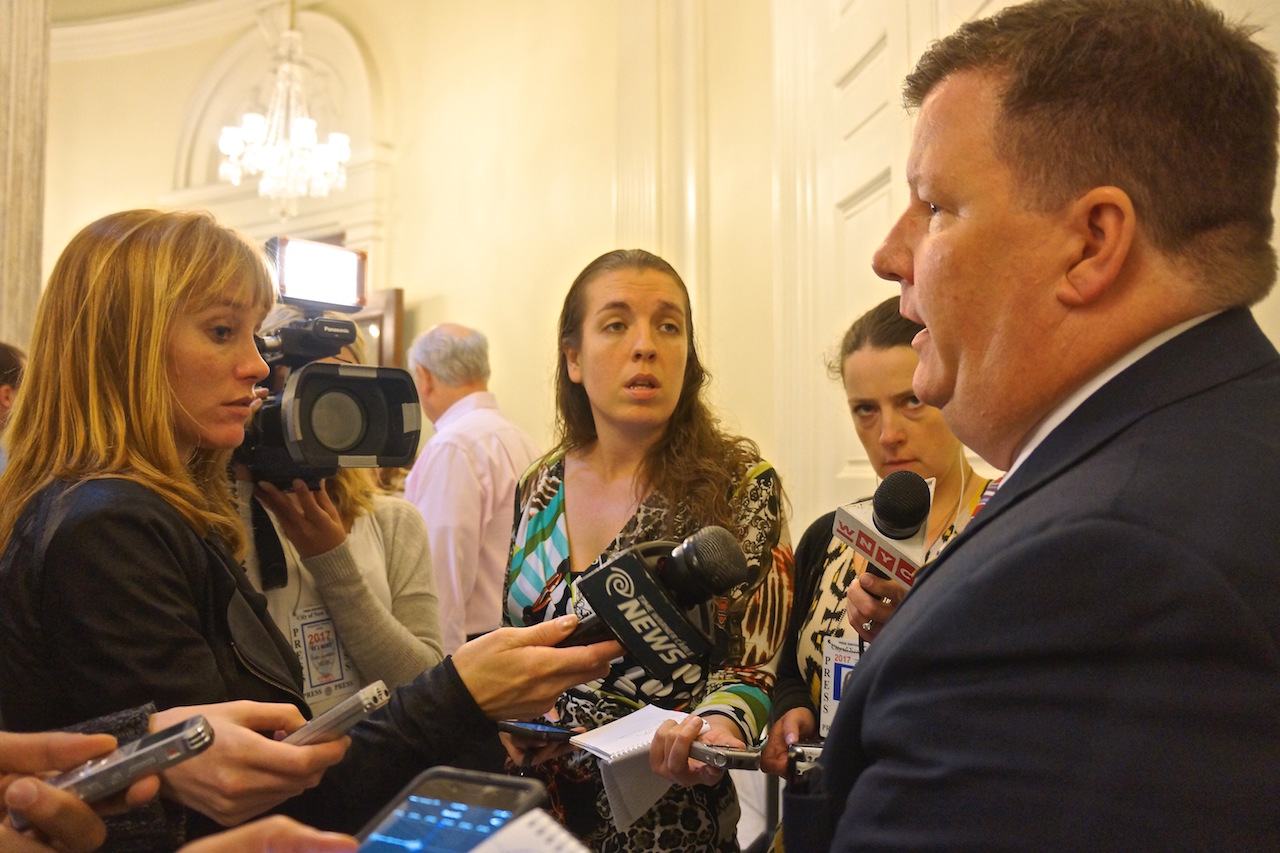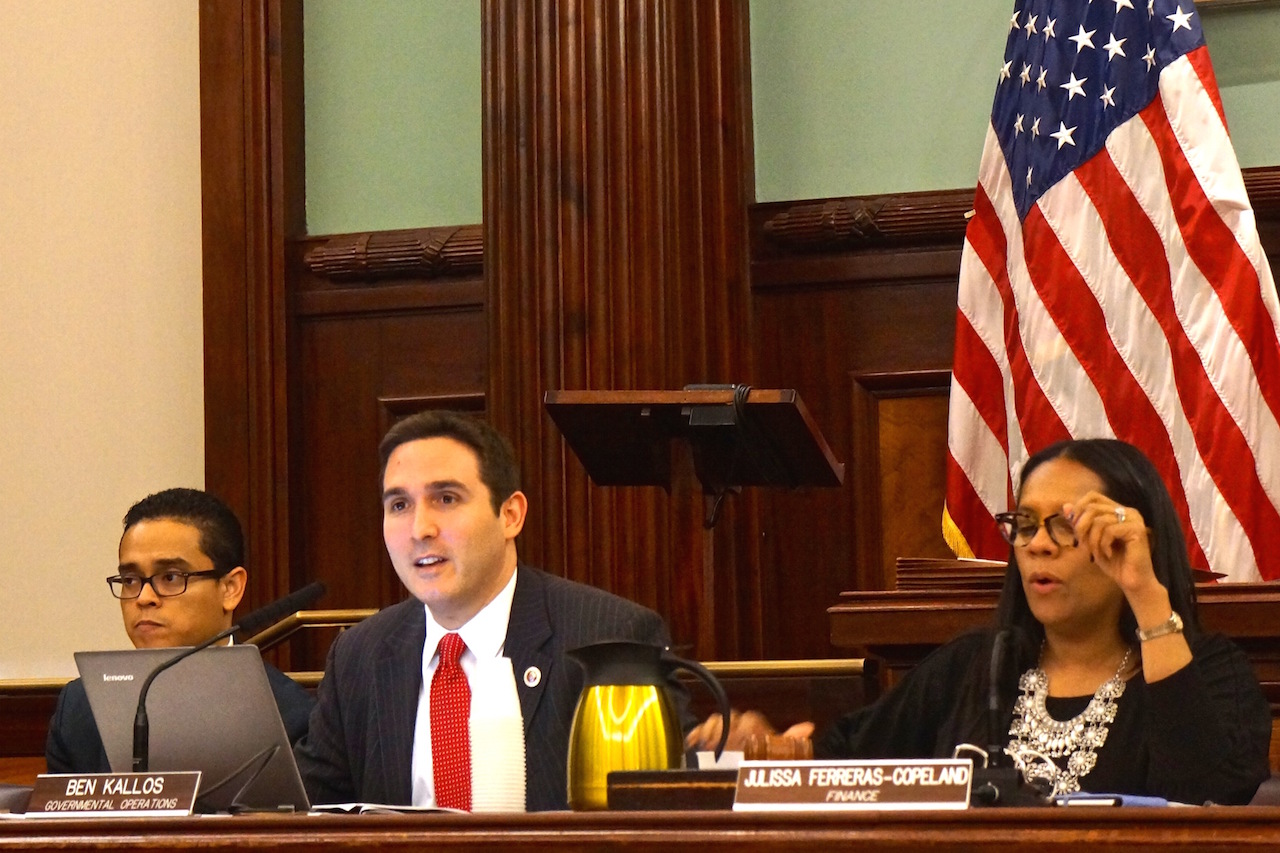
BY SARAH FERGUSON | Attention millennials: The New York City Board of Elections has a job for you.
Under withering cross-examination by city councilmembers over its disastrous handling of the April 19 presidential primary, B.O.E. Executive Director Michael Ryan offered yet another rationale for why New York’s election process is so blatantly bad.
Our poll workers suck.
Ryan said the city was in desperate need of a new, “younger” tech-savvy workforce to replace many of the older, party-appointed poll workers, some of whom, he conceded, had difficulty feeding ballots into printer machines on primary day.
“Our poll worker population has to get younger,” Ryan said, noting that younger generations are “decidedly more energetic and more enthusiastic and more embracing of [new] technologies.”
Not to mention the fact that 20 percent of the city’s poll workers didn’t bother to show up on election day, as Ryan disclosed to the incredulous councilmembers presiding over a two-hour budget hearing last Friday at City Hall.
“Recruitment is a really big deal,” Ryan said, returning to the theme frequently during his testimony.
One might be tempted to accuse Ryan of throwing poll workers under the bus in an effort to distract from the board’s own lapses.
As the chaos that unfolded across the city during the April 19 primary underscored, there’s plenty of ineptitude to go round.
In his opening statement, Ryan dutifully fell on his sword over the faulty purge of some 117,000 voters from the Brooklyn rolls.
“The board recognizes that the actions taken in Kings County should not have occurred,” Ryan stated, adding that he was “sorry” for engendering “public distrust” as a result.
Under questioning by the City Council, Ryan claimed staffers in the Brooklyn borough office had botched an honest effort to clean up the rolls by removing 117,000 names. The aim was to scrub anyone ineligible — i.e. duplicates, people who moved, died, had a felony conviction, etc.
Notices were sent warning all those who hadn’t voted since 2008, saying that they were at risk of losing their voting status. But Ryan said the Brooklyn office missed the important step of making sure voters had been designated “inactive,” which happens when mail sent to their address is returned. Instead, anyone who didn’t respond to the notice was dropped.
Ryan said he wanted to “dispel the myth” that all those purged were Democrats, as was initially reported. According to the board stats, of all those purged in Brooklyn, 25,000 were registered as Democrats, 12,000 were Republicans, and the rest were “blanks” — which is what the B.O.E. terms people who are unaffiliated, registered as independents or members of third parties. So most of those designated as invalid were shut out because New York has a closed primary that only allows you to vote if you are registered as Democrat or Republican.
Nevertheless, Ryan said he was still mystified as to how this purge could have occurred over the last two years without his and the nine other commissioners on the board knowing.
“Other than to say that they [the Brooklyn staff] made the decision on their own without input from executive management and/or the commissioners, there is no explanation,” Ryan told the Council. “They did it on their own. And they did it on their own with a misinterpretation of the procedures which are posted on our Web site and widely known.”
It’s worth noting that Ryan’s predecessor, George Gonzalez, was himself purged from office in 2010 for screwing up the ballot for a special election in Queens, among other things.

Thus far, the board has suspended without pay the Brooklyn chief clerk, Diane Haslett-Rudiano, a Republican, along with Deputy Clerk Betty Ann Canizio, a Democrat.
Both City Comptroller Scott Stringer and state Attorney General Eric Schneiderman have launched investigations of B.O.E.’s handling of the April 19 primary, and the City Council will be holding a special oversight hearing dedicated to the Brooklyn purge alone in June.
Ryan insisted no one was specifically targeted and there was no deliberate effort to disenfranchise people, as some Bernie Sanders supporters have charged.
Yet Ryan didn’t offer the councilmembers much help in parsing just how much of this mess is partisan, how much systemic incompetence, and how much due to the need to hire better staff and poll workers. Instead Ryan said he was “sorry” that the purge had helped fan the flames of conspiracists and groups now looking to sue the board for malfeasance.
At one point, Ryan went so far as to blame a “pre-existing narrative” advanced prior to the primary for helping stoke chaos on election day.
“There was an otherwise political narrative that was being stoked going into the primary,” Ryan told the Council. “We added gas onto that fire and that is regrettable.”
Ryan was referring to groups like Election Justice USA which went to court to try and block the certification of the April 19 results, and which is now collecting evidence from people who feel they were improperly removed from the rolls or had their party status switched prior to the primary, making them ineligible.
Election Justice is also offering to assist people seeking to challenge the rejection of their affidavit ballots. According to the certified results, some 121,056 affidavits were submitted citywide by voters turned away from the polls on April 19, but only 30,058 were deemed valid or “revived,” to use the parlance of the B.O.E.
By law, people have only 20 days following the certification to file a court challenge if their affidavit ballot was rejected, so that deadline is May 26.
At the hearing, councilmembers pressed Ryan for specifics on exactly what went down with the Brooklyn voter rolls. Of the 38,548 affidavits filed by voters in that borough, Ryan said only 9,153 people had their votes restored. When asked how many of those restored votes were from people included in the 117,000 purged from the Brooklyn rolls prior to the primary, Ryan said just 98.
“I’m concerned than the number may not be correct,” reacted Brooklyn Councilmember Robert Cornegy, who represents Bed Stuy and Crown Heights. “In my district alone, I was getting calls all day that entire day, and running around the district putting out fires.”
Ryan insisted the board had gone out of its way to validate all the ballots it could.
“We went through a very, very enhanced scrutiny of these affidavit ballots, the likes of which has not ever been done before,” he maintained.
“The affidavits were double- and triple-checked,” added Ryan, who testified that he personally had gone through a stack of 176 affidavits, “and the paperwork for them was 10 inches high.”
His remarks did little to assure Queens Councilmember Julissa Ferreras-Copeland, who chairs the Finance Committee. She asked Ryan whether he was ready to take up the offer by Mayor Bill de Blasio to approve $20 million more in funding to help the B.O.E. clean up its act.
The money is contingent on the board agreeing to a series of reforms, including expanding poll worker training, increasing salaries, and sending e-mail and text notifications to voters to notify them of changes to poll site locations, election dates and voting hours.
Earlier this month, the Council passed three bills requiring the B.O.E. to take similar steps to improve voter transparency and provide online access to things like voting status and polling site changes.
But Ryan fended off those efforts at reform, saying that with three more elections to host this year, including the congressional primary on June 28, the B.O.E. is just too hectic to make it happen in 2016.
“Implementing sweeping, broad or otherwise systemic changes to any I.T. [information technology] things that we do during this year would be difficult,” Ryan stated. “Rather than come here and give lip service and say, ‘Sure, we’ll get it done,’ and then miss the mark, we just testified previously that we didn’t think we’d be able to accomplish this in 2016.”
That answer didn’t sit well with Ferreras-Copeland.
“Your whole purpose is to communicate with the voters. How can we not have mastered that after all these years?” she demanded. Pointing to the upcoming June 28 congressional primary, Ferreras-Copeland asked: “How can we be confident that you will be ready?”
Ryan said the board had already began to implement some upgrades on its own, such as the “utilization” of computer “tablets” at all poll sites — though he conceded that not all poll workers understood how to use them.
Councilmber Ben Kallos of the Upper East Side wondered if throwing more money at the B.O.E. is the answer.
“Mayor de Blasio restored the B.O.E. budget to $123 million in 2016,” he noted. “Is that enough, not only to run an election, but to not run it poorly?”
Pointing to the high stakes this November, Kallos warned: “The presidential election is the Super Bowl of the elections. We can’t see the same problems as we’ve seen in the primary.”
Kallos is an I.T. geek who prior to being elected to the Council designed an online database called VoterSearch.org. He practically scoffed at Ryan for not being able to keep track of voting stats, and asked why B.O.E. staffers and poll workers can’t be hired through public job postings under a “merit-based” system, instead of the current patronage mill we have now.
Ryan said that currently, 40 percent of the B.O.E. workforce comes via referrals from either the Democrat and Republican party bosses. Changing that further, he said, would be up to the B.O.E. borough chiefs and board of commissioners to decide.
But Ryan did think it was a good idea to raise the pay of poll workers from $200 a day to $300 a day, and to give poll site coordinators $400 a day for their 18 hours of service.
He said the B.O.E. is already working with an outside consultant to overhaul poll worker training and improve voter outreach. The B.O.E. is planning a “media blitz,” with ads on subways and buses aimed at “driving voters not only to our Web site but to various social media sites which younger people seem to be availing themselves of more frequently,” Ryan said.
“I think there is a direct correlation between the apparent voter apathy and the lack of interest or reduction of people willing to become poll workers,” he added.
In fact, if there’s one thing the B.O.E.’s performance on April 19 has accomplished it’s to “gin up” interest in the city’s unnecessarily restrictive electoral process. Since the primary, the B.O.E. has been deluged with complaints and seen its normally comatose hearings hijacked by pissed-off New Yorkers angry about what they view as a pattern of flagrant and systemic disenfranchisement.
On Tuesday evening, many of them came to register their complaints before the Campaign Finance Board’s Voter Assistance Advisory Committee. You can view the proceedings online here. https://www.nyccfb.info/media/videos/vaac-meeting-public-hearing
































